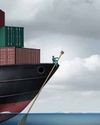
The first session examined under the microscope each and every aspect of inland logistics that either adds to the cost or can reduce cost. “One of the ways for reducing cost is by slashing taxes on logistics,” suggested Tarlochan Singh Ahluwalia, President, Northern India Shipper Association. For example, If 26 metric tonnes of rice is sent stuffed in a container through ICD from north India to Mundra Port the cost is ₹73000. The same consignment when sent in a truck costs about 60 per cent. Sending by road the exporter saves on THC, 400 litres of fuel is consumed on the journey which attracts ₹10,000 in taxes on fuel. The logistics cost via road from factory to the port is ₹30,000, which includes tax on fuel and toll tax, the later is also ₹10,000. If the government gives refund of these two taxes then costs can be reduced.
“The government says taxes cannot be exported and thus we are getting the IGST refund. If the government wants to refund the taxes, then why not refund the taxes on fuel as they are on the higher side, suggested Ahluwalia. Warehousing charges for stuffing and de-stuffing of goods also come upto ₹10,000 which can be avoided if the government allows a separate area for DPE consignments stuffing and de-stuffing. If the above mentioned charges are removed then cost can come down by 50 per cent.
Ahluwalia added, to cut cost we can focus on logistics because it doesn’t add any value into the product directly. The freight forwarders and CHAs should look at the logistics chain and figure out ways to cut cost or add value to products. For example, from North India basmati rice is exported through Mundra Port. There are 2 options for connecting to the port – one is CONCOR that operates on a profit of 16.7 per cent, while truck operators work on 2 per cent profit. If all Navratna’s like CONCOR aim at such high profit then cutting cost will be difficult.
This story is from the {{IssueName}} edition of {{MagazineName}}.
Start your 7-day Magzter GOLD free trial to access thousands of curated premium stories, and 9,000+ magazines and newspapers.
Already a subscriber ? Sign In
This story is from the {{IssueName}} edition of {{MagazineName}}.
Start your 7-day Magzter GOLD free trial to access thousands of curated premium stories, and 9,000+ magazines and newspapers.
Already a subscriber? Sign In

Impact Of Covid-19 On Shipping And Logistics
Industry stalwarts discuss threadbare the prevailing logistics and supply chain scenario and issues in clearing cargo during the COVID-19 lockdown

Digital Platforms Defy Lockdown
Digital trading modules such as eNAM are enabling farmers to move their produce from farm to market even during the lockdown

GARMENT TRADE TRAMPLED
As retailers face a shutdown in US and Europe, the cascading affect has caused mass cancellation of orders in Bangladesh

TRADE RESUMES WITH CHINA
While India has allowed uninterrupted movement of imports into Nepal even during lockdown, China is reopening its borders as it emerges from the pandemic
LESS HUMAN INTENSIVE, MORE DATA DRIVEN
AI provides transformational opportunity for logistics industry by improving customer experience, operational efficiency, faster turnaround time and lower cost while ensuring security and transparency. Macro environment requires industry to transform to be less human intensive, agile and data driven, all of which can be accelerated by AI adoption, shares Gangadhar Gude, Founder & CEO, atai.ai

SHAKEN AND STIRRED
The COVID-19 pandemic has partially paralysed the logistics and supply chain, but the industry is still deterred to ensure supply of essentials continues

TRADE STUCK, ECONOMY SLOWS DOWN
Sri Lankan economy slows down as trade deficit widens and supply chain disrupts amidst lockdown

LENDING INTELLIGENCE TO SUPPLY CHAIN
If you’re shipping millions of dollars’ worth of pharmaceuticals, high-end electronics, expensive seafood, or precious metals, what would you be willing to pay for the ability to ‘ask’ your shipment where it is right now and whether it’s ok? What would you pay for a freight smart enough to raise an alarm before it spoils? Artificial Intelligence enables that and much more…

CONTAINER LINES SIGNAL ‘SOS'
As the per-unit cost of operations increases many lines are forced to blank sailings which has hit their bottom line real hard. The Government and Terminal Operators therefore need to actively consider reduction in Vessel Related Costs

IMO 2020 And The Covid-19 Curse
The COVID-19 outbreak has shaken and stirred the already volatile bunker market. While the refiners adjust their capacities and shipping lines choose their path to compliance, the market dynamics are yet to reach an equilibrium